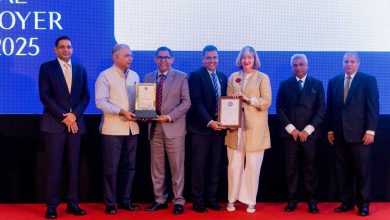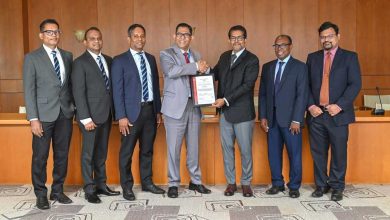BANK OF CEYLON
“ BOC is more than a bank; it is a national partner in progress “
“BOC has played a pivotal role in enabling inclusive entrepreneurship in Sri Lanka”
-A Conversation with Prof. Dewasiri N. Jayantha
Professor in Finance, Sabaragamuwa University of Sri Lanka
President, Sri Lanka Institute of Marketing (SLIM)


We are proud to present an exclusive interview with the inspiring pracademic—Prof. Dewasiri N. Jayantha, President of the Sri Lanka Institute of Marketing (SLIM) and Professor in Finance at the Sabaragamuwa University of Sri Lanka. With a remarkable career that bridges the worlds of industry and academia, Prof. Dewasiri is a shining example of how resilience, practical experience, and a lifelong commitment to learning can shape a transformative journey.
His leadership in finance, marketing, entrepreneurship, and higher education continues to inspire and empower the next generation of innovators and professionals across Sri Lanka and beyond.
In this exclusive interview, Professor Dewasiri shares his insights on youth entrepreneurship, the role of research and technology, and the path forward for economic transformation in Sri Lanka.
Q: How do you envision the role of youth entrepreneurship in driving economic growth, and what key bank strategies do you believe are necessary to foster it effectively?
Prof. Dewasiri:
Youth entrepreneurship is not just a component of economic growth—it is its lifeblood. Young entrepreneurs bring energy, creativity, and boldness to the table. In a time where traditional job markets are shrinking and automation is rising, entrepreneurship provides a pathway for self-reliance, innovation, and inclusive growth.
To truly unleash this potential, banks must go beyond traditional lending. They need to act as development partners—offering access to capital, mentorship, digital tools, and business literacy. Tailored financial products like startup grants, micro-loans, and revolving credit lines—with flexible terms—can help reduce the risk burden for first-time entrepreneurs.
Most importantly, youth need trust and encouragement. When a bank believes in a young person’s dream, it creates confidence, which is often more powerful than money itself.
Q: Reflecting on your academic journey, what have been your most significant contributions to the fields of entrepreneurship and economic development?
Prof. Dewasiri:
My transition into academia, after 17 years in the corporate world, has always been guided by the belief that research should inform practical, real-world solutions. One of my early contributions was introducing data triangulation in finance research. This approach has helped generate more relevant, context-specific knowledge to support entrepreneurship and policy development in South Asia. In parallel, I’ve actively worked to mentor doctoral students, build research capacity, and translate academic work into public knowledge, including weekly columns designed to support entrepreneurs and SMEs.
A recent milestone in this journey has been the collaboration between SLIM and the Ministry of Industry and Entrepreneurship Development. This partnership supports the national SME Development Strategy Framework, a ten-year roadmap to strengthen Sri Lanka’s entrepreneurial ecosystem. Through this initiative, we are contributing to key programmes such as the National SME Database, SME Call Centre, National Incubator Model, the Certified Relationship Officer and Brand Strategist programmes, and the National SME Development Awards. .
Q: Given BOC’s position as a leading banking giant, how have you witnessed its role in promoting and supporting women and young entrepreneurs, particularly through initiatives like Youth Loan, E-Creator, Ranliya, and BOC Mithuru?
Prof. Dewasiri:
BOC has played a pivotal role in enabling inclusive entrepreneurship in Sri Lanka. I’ve observed, with great appreciation, how programmes like Youth Loan, E-Creator, Ranliya, and BOC Mithuru are not only financial tools, but also catalysts for social transformation.
The Ranliya program, in particular, has empowered countless women to step into economic roles traditionally unavailable to them. The Youth Loan and E-Creator programmes have created vital pathways for digital entrepreneurs, creatives, and tech-driven startups—sectors where young people naturally thrive.
These initiatives reflect a progressive mindset—recognising that diverse and inclusive entrepreneurship is key to building a resilient, equitable economy.
Q: How important are research, development, and the integration of technology in advancing entrepreneurship?
Prof. Dewasiri:
Absolutely critical. In today’s world, entrepreneurship without innovation is survivalist; with innovation, it becomes transformative. Research and development (R&D) gives entrepreneurs the tools to understand markets, forecast demand, reduce risk, and enhance competitiveness.
At the same time, technology is the great equaliser. It enables a rural entrepreneur to sell to global markets, or a school leaver to create digital solutions. However, access alone isn’t enough—what we need is integration: embedding research and tech into business models, supply chains, and financing systems.
Banks like BOC can lead here by digitising credit access, supporting research-based incubators, and collaborating with universities to support evidence-driven innovation.
Q: What is the nature of the relationship between Bank of Ceylon and the University of Sabaragamuwa, and how has it evolved?
Prof. Dewasiri:
The relationship between the Bank of Ceylon and the University of Sabaragamuwa is both strategic and deeply rooted in mutual commitment to national development. BOC is our official banking partner, and more than that, it plays a critical role as the exclusive business promotion partner for the Faculty of Management Studies. Over the years, this partnership has evolved from basic service provision to a long-term investment in research, development, and entrepreneurship.
BOC continuously supports our faculty’s key initiatives—ranging from research conferences and startup pitch events to entrepreneurial development programmes and financial literacy outreach. Their proactive engagement reflects not just sponsorship, but a genuine belief in the university’s potential to shape Sri Lanka’s next generation of leaders and innovators.
This collaboration stands as a model of how academia and industry can work together to build a knowledge-driven, innovation-led economy. As we expand our efforts in research and entrepreneurship, BOC remains an indispensable partner in driving inclusive growth, capacity building, and national transformation.
Q: As the national body for marketing, how does SLIM work with the Bank of Ceylon to uplift marketing and entrepreneurship in Sri Lanka?
Prof. Dewasiri:
As the national body for marketing, SLIM has a strong and enduring partnership with the Bank of Ceylon, which serves as our exclusive corporate banking and business promotion partner for a range of high-impact national events. These include SLIM Brand Excellence, SLIM Digis, the National Sales Awards, Effie Awards, People’s Awards, and the National SME Development Awards. Through these platforms, BOC has played a key role in not only promoting marketing excellence but also in fostering an entrepreneurial culture across the country.
BOC’s unwavering support goes far beyond sponsorship. Their involvement represents a shared national commitment to professionalising marketing, empowering SMEs, and encouraging innovation-led growth. These events bring together entrepreneurs, marketers, and industry leaders, and BOC’s presence amplifies their impact by bridging the gap between financial empowerment and strategic marketing knowledge.
Together, SLIM and BOC are working to position marketing as a catalyst for business success and national development, while building a more resilient and opportunity-rich ecosystem for entrepreneurs and professionals in Sri Lanka.
Q: How do you view Bank of Ceylon’s overall contribution to promoting youth and women entrepreneurship, as well as its impact on the education sector in Sri Lanka?
Prof. Dewasiri:
BOC’s contribution is significant and multifaceted. By supporting youth and women entrepreneurs, the bank is directly investing in inclusive economic resilience. These are the segments that often face the most significant barriers to entry—whether due to access, confidence, or social norms.
Beyond finance, BOC’s engagement with the education sector—through scholarships, campus banking, research support, and public-private initiatives—has made it a trusted enabler of capacity building.
I believe BOC is more than a bank; it is a national partner in progress. As Sri Lanka moves into a knowledge economy, institutions like BOC will play a vital role—not just in financing growth, but in facilitating transformation.
Final Words
Prof. Dewasiri:
We are living through a time when the boundaries between education, entrepreneurship, and economic development are rapidly dissolving. To move forward as a country, we need stronger ecosystems of support, where institutions like BOC, universities, and communities work in synergy.
To the youth of Sri Lanka, my message is this: Believe in your vision, equip yourself with knowledge, and find partners who will walk with you—not just invest in you. When banks, educators, and entrepreneurs unite with purpose, we don’t just build businesses—we create a better future.





